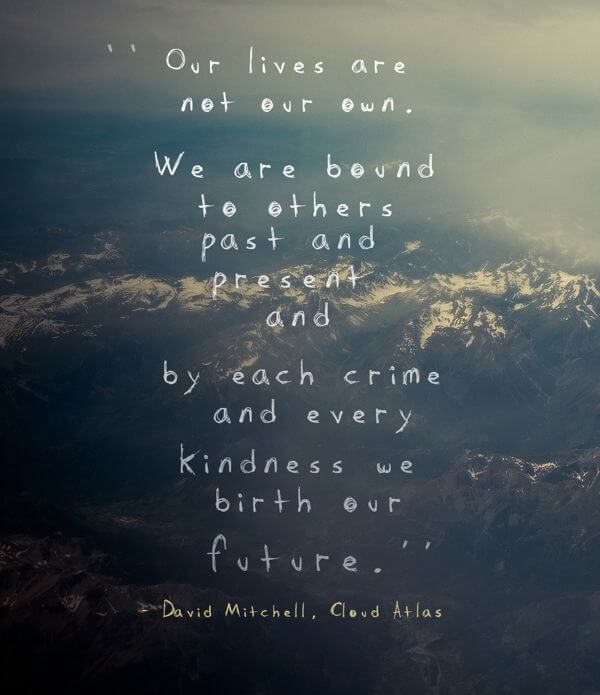
Following on from yesterday’s article: “Beautiful Leadership – Shining Eyes“, after writing that article I found myself listening to some movie soundtrack pieces and then the end title from Cloud Atlas came on.
Today I’ll take the final thought from the TED talk by Benjamin Zander featured yesterday, then link it to beauty, the movies and, specifically, to Cloud Atlas.
So, at the very end of Benjamin Zander’s TED talk on classical music, when he had the eyes of the audience shining and their total and immersed attention, he shared this unrelated closing thought :
“So now, I have one last thought, which is that it really makes a difference what we say — the words that come out of our mouth. I learned this from a woman who survived Auschwitz, one of the rare survivors. She went to Auschwitz when she was 15 years old. And … And her brother was eight, and the parents were lost. And she told me this, she said, “We were in the train going to Auschwitz, and I looked down and saw my brother’s shoes were missing. I said, ‘Why are you so stupid, can’t you keep your things together for goodness’ sake?'” The way an elder sister might speak to a younger brother. Unfortunately, it was the last thing she ever said to him, because she never saw him again. He did not survive. And so when she came out of Auschwitz, she made a vow. She told me this. She said, “I walked out of Auschwitz into life and I made a vow. And the vow was, “I will never say anything that couldn’t stand as the last thing I ever say.” Now, can we do that? No. And we’ll make ourselves wrong and others wrong. But it is a possibility to live into.
Beautiful thought, and beautiful leadership.
Now, as Alan Moore says, “beauty is the key to everything”, and through the lens of beauty we can elevate ourselves, we can aspire to be the best we can, unlocking our potential and those of others.
The lady in the story said that “I will never say anything that couldn’t stand as the last thing I ever say”.
David Mitchell, with Cloud Atlas, wrote a wondrous book that I love. It was then made into a movie. Loving movies as I do, there are many posts on this site under the theme “Movies with Meaning”, and in one of them I featured Cloud Atlas. writing:
“The novel involved six nested stories from six different times in history. I love the book, and (if anything) love the movie more. Deemed unfilmable due to the structure of the book, nonetheless, the amazing Wachowski’s (the creators of The Matrix) created a wondrous film, entertaining and highly thought-provoking, both of which on show at the highest level as they pull together all the inter-connected threads as the movie comes towards the end.
Oh, and I ADORE the musical theme.”
As the quote in the image above and the book and movie expand upon with those ultimately deeply interconnected stories have us feel, everything is connected, everyone is connected.
Every moment, everything we do, everything we say can make an impact in that moment, and perhaps may resonate backwards and forwards across time as Cloud Atlas talks about.
“Our lives are not our own. we are bound to others, past and present. And by each crime and every kindness, we birth our future.”
Thoughts to consider for our ourselves and in how we lead in the world.
At a far simpler and less intellectual level, though, I find Cloud Atlas mesmerisingly beautiful and the movie beautifully created by the Wachowskis so much more emotional and therefore impactful. I’ve watched the nearly three-hour long movie countless times, and yet when the end theme comes on, I am always transfixed to the very end of the credits.
I encourage you to watch the movie, yet even without it, the end title theme stands alone.
I give you this moment of beauty.
